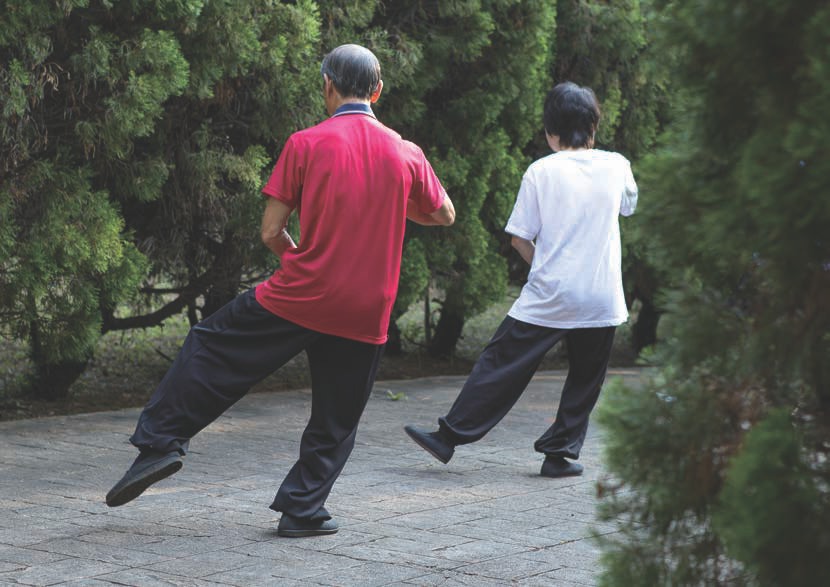
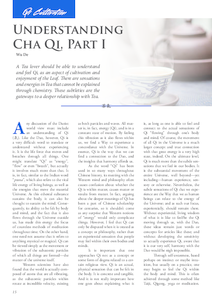 |
|

Any discussion of the Daoist world view must include an understanding of Qi (氣). Like the Dao, however, Qi is a very difficult word to translate or understand without experiencing it. It is the life force that moves and breathes through all things. One might translate "Qi" as "energy", "flow" or even "breath", but actually it involves much more than that. It is, in fact, similar to the Indian word "prana", which also refers to the vital life energy of living beings, as well as the energies that move the material Universe. As this ethereal substance sustains the body, it can also be thought to sustain the mind. Consequently, its ability to be felt by body and mind, and the fact that it also flows through the Universe outside us, has made this energy the focus of countless methods of meditation throughout time. On the other hand, one need not assume that it refers to anything mystical or magical. Qi can be viewed simply as the movement or vibration of the subatomic particles of which all things are formed - the matter of the universe itself.
Western scientists have also found that the world is actually composed of atoms that are all vibrating, as the subatomic particles within rotate at incredible velocity, existing as both particles and waves. All matter is, in fact, energy (Qi), and is in a constant state of motion. By feeling this vibration as it also flows within us, we find a Way to experience a concordance with the Universe. In essence, Qi is the way that we can find a connection to the Dao, and the insights that harmony affords us.
As the word "Qi" has been used in so many ways throughout Chinese history, its meeting with the Western mind and philosophy often causes confusion about whether the Qi is within matter, causes matter or results from matter. In fact, arguing about the deeper meanings of Qi has been a part of Chinese scholarship for centuries, so it shouldn't come as any surprise that Western notions of "energy" would only complicate things. However, I feel that Qi can only be disputed when it is treated as a concept or philosophy, rather than an experiential sensation that people may feel within their own bodies and minds.
It is important that one approaches Qi not as a concept or some form of dogma related to a certain religious view. Qi is an actual, physical sensation that can be felt in the body. It is concrete and tangible. And it is not really important how one goes about explaining what it is, as long as one is able to feel and connect to the actual sensations of Qi "flowing" through one's body and mind. Of course, the movement of all Qi in the Universe is a much larger concept and true connection with that great energy is a very high state, indeed. On the ultimate level, Qi is much more than the subtle sensations that we feel in our bodies. It is the substantial movement of the entire Universe, well beyond - yet including - human experience, sensory or otherwise. Nevertheless, the subtle sensations of Qi that we experience are the Way that we as human beings can relate to the energy of the Universe; and as such our focus, experientially, should remain there. Without experiential, living wisdom of what it is like to feel/be the Qi moving through us, with the Dao, these ideas remain just words or concepts for articles like these; and without developing the sensitivity to actually experience Qi, aware that it is our very self, harmony with the Dao would be nigh impossible.
Through self-awareness, based perhaps on instinct or maybe intuition, but usually on a practice, one may begin to feel the Qi within the body and mind. This is often achieved through some method like Taiji, Qigong, yoga or meditation. Since ancient times, Tea sages have also known and discussed the Qi of Tea, and "Cha Qi" has always been a part of the appreciation of the Leaf. When we drink Tea, the Cha Qi moves through our bodies, becoming the focal point for self-awareness, and Tea as a Dao.
However, it is hard to say whether the Qi is already in us, and the Tea only inspires it to begin moving, flowing, or if it is in the Tea. Maybe it is both. However it occurs, there is definitely a very real experience of Qi in Tea. One might think of it as a sort of dialogue going on inside the body between the soul and the Tea. But it is important to remember that once you drink a Tea, it becomes you. It is your Qi, your body. You are Tea, in other words!
Different Teas produce different kinds of Qi. Often the flow of the Qi changes direction, moves quickly or impulsively, or encircles the body. Sometimes the Qi stays on the surface; other times it's deep inside. And sometimes there isn't any Qi at all, or it is perhaps too subtle for us to feel. Many times natural, organic or Living Teas have a Qi that slowly rises throughout the duration of a Tea session: The first few steepings are devoid of feeling, but then ever so slowly the Qi will begin to flow through the body, and may be felt as vibrations, tingling or other subtle sensations.
My first encounters with Qi came through practicing meditation, not through drinking Tea. My Teacher instructs us to use breathing exercises to calm the mind down, stopping the internal dialogue to create a tranquil base of heightened concentration. Then, when the mind is quiet enough, we begin learning to focus on the sensations in our bodies. The idea is that every single part of the body has some sensation, and if we concentrate our minds on our small toe, for example, we can feel it. Slowly, as we practice for days, weeks or even years feeling all the gross sensations in each part of our body, inside and out, we begin to feel subtler and subtler sensations, until finally we begin to feel a kind of "flow" of tingling vibrations. We learn to move this flow, "sweeping" it up and down the body in waves of energy. What initially attracted me to this kind of meditation was the fact that I could actually feel what the Teacher was discussing. Previously, I had practiced many forms of meditation that involved different kinds of imagination, verbalization and/ or contemplation, all taking place primarily within the mind. This was a far more concrete experience, as I was feeling it in my body - and the calmness, equanimity and wisdom that followed were that much more pronounced to me. A more 'bodily' meditation that kept the intellect at a distance was far better medicine for me. As the years passed and my relationship with Tea developed, I came to understand that what I had been feeling was Qi. This prepared me to be more sensitive to Cha Qi, recognizing the changes that occur in my body on the subtlest level when I drink different Teas.
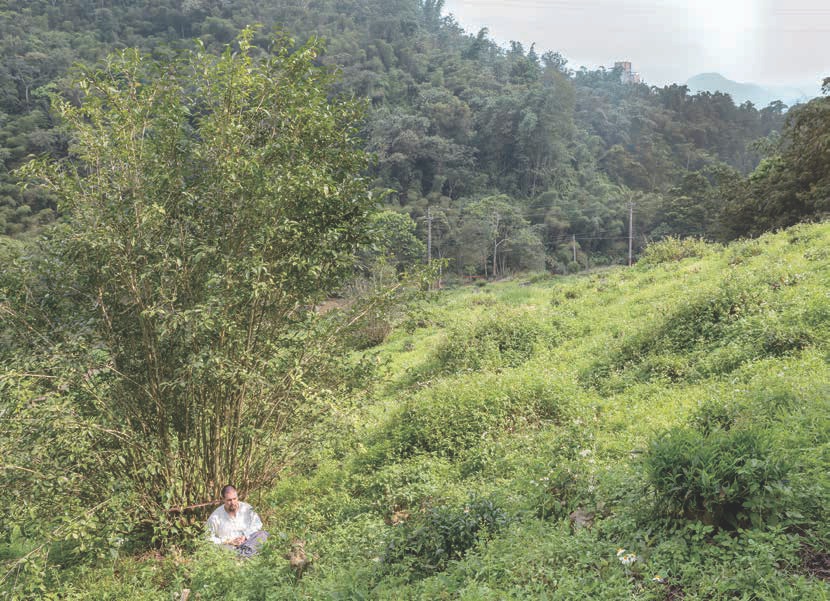
You may have noticed that in this, and other issues of Global Tea Hut, we sometimes capitalize "Tea". In this issue on Qi cultivation, you may find this trend more pronounced. We do this to honor Tea as a plant spirit, an entheogen. Entheogens are plant medicines used by shamans to lead to an experience of the Divine. For thousands and thousands of years before it was ever a commodity, Tea was a plant medicine - a "She" that people worked with as a spiritual elixir. It's time we returned some of that to our modern world. We aren't suggesting a return to olden times or ideas, some of which may be overly superstitious, but rather that more reverence for the Leaf is worthwhile, and we can start that process with the language we use to talk about Tea. When we speak about Tea as a Her, it isn't meant to evoke gender - or even to anthropomorphize Tea - but rather to show respect. "It" doesn't feel as nice, and from boats to guitars, we all inherently know that, and respect the things we love accordingly! Nothing could benefit us all more than a bit more respect for the living beings that share this world with us, including our plant relatives!

Most Tea-lovers these days pay much more attention to the fragrance, liquor, flavor and sensations in the mouth and throat that their Teas offer. Maybe some feel that the idea of Qi is too abstract or perhaps beyond the experience of an average person. In the beginning, when one first starts enjoying Tea, one may have reservations about Qi. Is it some kind of mystical force or religious experience involving faith? Perhaps someone will tell them of the upward movement of some kinds of Qi, ultimately reaching the back of the head in an explosion of bliss called "Qi da bai hui (氣達百會)", and they will find the idea farfetched. Even intellectually the words seem too intangible to understand. However, I have found that if one follows some guidelines when approaching a Tea session, almost anyone can eventually begin to feel Qi in their body. And that ability becomes paramount in every aspect of Cha Dao, from finding the best Tea leaves, water and Teaware to the way that we prepare our Tea, imbuing the Tea ceremony with Qi that makes those there feel calm and joyous.
In these many issues of Global Tea Hut, we have discussed the ways in which aged teas are better than new, mountain water better than bottled water and antique teaware better than its modern equivalent - and all this has to do, ultimately, with Qi. As I mentioned in last month's Puerh Edition, many teachers say that the very expensive, old teas are only worth such high prices in terms of their Qi. If one is just seeking nice flavors in the mouth, there are many foods and candies that can provide such sensations for a fraction of the cost.
The best water, from the place where the spring starts moving, as we've also discussed, is that much better because it enhances the Qi of the Tea liquor. And anyone who has ever experimented with using different kinds of teaware to gauge the effects they have on Qi can testify to the fact that most antique teaware enhances the experience of the Qi in gongfu Tea. Moreover, last month's Gongfu Tea Tips discussed the importance of the brewer in the Tea ceremony, and we gave you an experiment to verify that the Tea does, in fact, change when we switch brewers. At that time, we said that the brewer drastically influences the Tea. Well, that too was in relation to the Qi that each brewer brings to the Tea ceremony. Of course the "energy" of the one handling the kettle, Teapot, leaves and cups will influence the Qi of the liquor, as the entire ceremony is flowing through them.
Qi is therefore at the very core of an understanding of Cha Dao, and without it I think Tea would never have been recognized by all the sages and seers throughout time, and never inspired a center such as this. By learning to become sensitive to the way that Tea affects the Qi in our bodies, we develop self-awareness through introversion, quietude, peace, tranquility and equanimity. Beyond just the simplicity and Zen-like clarity of being present, absorbed and aware of a moment of Tea - beyond that, the Qi connects us to the energy and movement of the entire Universe, the Dao.
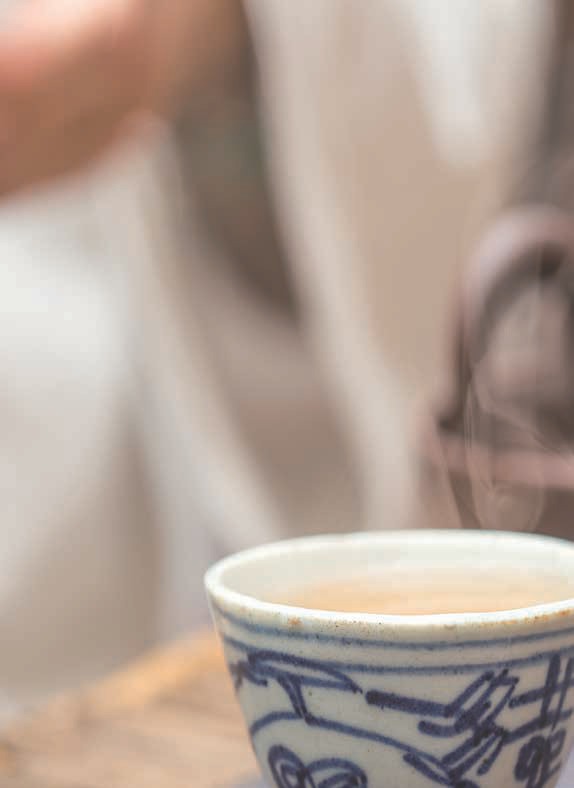
Sometimes when a concept or experience is difficult to explain or share with others, as is definitely true with Qi, it helps to eliminate some of the factors surrounding one's focus to help illuminate the obscurity. When practicing meditation in my tradition, for example, the Teacher often reminds us to always try to sublimate gross sensations, dissecting them to find the subtler components that make them up - until we reach the subtlest flow of vibrations, felt as a kind of tingling movement, Qi. Nonetheless, even those that are not trained to feel the subtler sensations that come with the flow of Qi within us will still be affected by it. After all, the atoms of the world are vibrating with energy regardless of whether we are aware of it, and as such our bodies are vibrating and changing all the time whether we are sensitive to it or not. Unfortunately, many human beings have lost their intuition and sensitivity because modern civilization is too focused on external stimuli. Often times, people will just feel a general sense of ease or comfort when drinking fine teas.
When we drink Tea, the Qi within our bodies begins to flow in various ways. Because of poor health, diet or even posture many of us will at times, or even often, have blockages that will hinder the movement of Qi. Breaking through these obstructions often results in some kind of gross sensation or even emotional uprising in us. Besides these obstacles to the flow of Qi, Tea drinking itself also results in grosser sensations, of course. Drinking Tea may produce gross sensations like heat, perspiration or palpitation. Any of these sensations are either the effect of the Qi breaking through blockages or perhaps the nature of our Tea leaves, maybe the caffeine even. These gross sensations should not be confused with Qi itself.
It can't be stressed enough that Qi is not a synonym for caffeine; it is not a heightened sense of hyperactivity, a warmth in the chest; it is not sweating or heat - all of these are either the effects of the Qi as it moves through us, or perhaps merely characteristics of the Tea itself. Some are also the side effects of breaking through blockages. Actually, the best teas - like very old puerh teas for example - will not keep us awake at all. Quite the opposite, in fact. Really great teas will calm us down to the point that we often sleep better, longer and deeper after drinking them. I can't tell you how many times I have heard someone mention how surprised they were to find that they slept so well and comfortably after a long session with some fine Tea.
By ruling out all the gross sensations that come as effects of the Qi or tea itself, one can begin to concentrate on finding the sensation of the Cha Qi, for it is there. Qi is not an illusory concept in the mind, a belief or a philosophy. It is an actual sensation and can be felt in the body, if one but learns how to listen. Of course, finding the words to describe that sensation is very difficult, and subjective. To me it feels almost like a tickly, tingling, prickly kind of flow when it is on the surface. Almost like, yet also different from, a feeling of goose bumps when one is frightened. Other times, when the Qi is deep and penetrative it feels almost cloud-like, puffy and one's body feels very light. In those instances the "wavelength" (for lack of a better word) of the vibrations seems too narrow (changing quickly) to be what I would call "tingly", and the sensation is more akin to numbness.
Alas, no turn of phrase or curl of the brush, no matter how skilled the calligrapher, could ever really capture the essence of experiencing Qi. We have, however, had several guests from all over the world that were able to begin feeling Qi after practicing for a bit. I have also witnessed several seminars in which hundreds of people attended, many very skeptical, who then went on to describe similar sensations and experiences. I remember an American friend who had already been a Tea drinker for a few years when he came to visit. By following some of the guidelines suggested for learning to approach Qi, he was, at the end of a week or so, experiencing it himself. He told me later that he had used the words "Cha Qi" in Tea reviews and discussions prior to this, but hadn't really ever experienced it - confusing it for a caffeine rush or the warmth in his chest as the hot liquid went down. He was very excited that he now had the ability to discuss Qi in the way it was meant to be, the way it was approached even in ancient times.
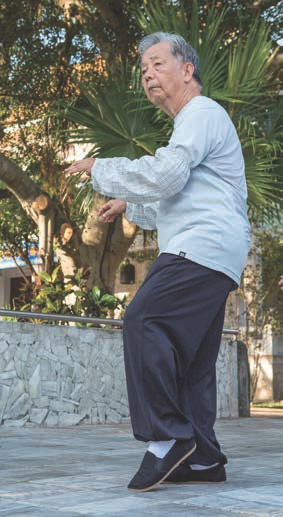
Since ancient times, Chinese medicine has focused on the movement of Qi and stipulated that illnesses are often caused by the obstruction of this flow in a certain portion of the body. In Traditional Chinese Medicine (TCM), most all illnesses stem from stagnation.
Acupuncture is a healing technique meant to release these blockages. The fact that Cha Qi can also pass through the body so fluently means that it too has a similar healing power. Thus by appreciating good Tea in quiet, one is in effect cleansing the body, making it a proper vessel through which Qi flows. Tea helps in digestion, blood circulation and has several other health benefits known to Chinese doctors for thousands of years, and the way it causes our Qi to flow is just one more of its beneficial qualities. Beyond just meditation, serenity or calm joy, this flow of Qi is healthy for the body and spirit, relaxing us, washing away stress - both bodily and mentally. The movement of Qi opens us up and allows us to experience ourselves as a part of this Universe.
The earliest theoretical treatise on Chinese medicine was in the form of a dialogue between the emperor and the sage Qi Bo, called "The Yellow Emperor's Classics of Inner Wisdom" (Huang Di Neijing). In this book the emperor asks the sage about the meaning of the word "Qi" and he describes it simply as a measurement of time equal to 15 of the 360 degrees that the Earth must travel in a year. The king doesn't really understand the connection between this seemingly mundane measurement and all the esoteric Daoist knowledge hidden within the word "Qi". What the sage was in essence saying was that the rhythmic changes in the cycle of the Earth are connected to all things in the Universe, that this word "Qi" was that very flow of change itself, and understanding it was to understand Nature, agriculture, society and even personal health, holistically. At that time, astronomy and astrology weren't curious classes taken as requisites for other majors, but central to the life of such masters living out in the mountains, closer to the stars than we could imagine. Qi Bo was telling the emperor to look to Nature: the rhythms of the Earth and the Heavens for an answer to the movement of Qi. Without an experiential understanding of this change, however, this intellectual clarity is of little use, and I doubt the emperor was any less confused for asking, though such was the Way of those ancient sages. We must find a way to connect more fundamentally to this inner melody, being the Dao rather than discussing it. We are the 15 of 360 degrees!
Like the journey we take within ourselves, finding subtler and subtler aspects of experience and connection to the Dao, the whole Way itself is one of transcendence - constantly sublimating reality to find deeper and deeper aspects of existence. At first Tea is sensual, connecting us with pleasure, enjoyment of flavor and aroma. Then we begin to feel the Qi, the bliss inviting us to explore ourselves deeper until we find the empty place where our flow is the flow of the Universe, the Dao.
The connection that we can achieve and maintain through Tea is an understanding that there really is no difference between the various aspects of the Universe, in the sense that they are all facets of the same totality, the Dao. Qi is the movement of this totality. For us, we use our bodies and minds as objects of focus, becoming aware of the present moment as it is experienced, lived. The feeling of Qi connects us to the energy as it flows through us, moving in and out like the breath that also connects us all to each other, to the world. Shunryu Suzuki once said, " 'You' means to be aware of the Universe in the form of you, and 'I' means to be aware of it in the form of I. You and I are just swinging doors. This kind of understanding is necessary. This should not even be called understanding; it is actually the true experience of life through Zen practice", succinctly capturing the Way that our experience can dissolve the sense of separation that we often create between ourselves, others and the Dao. The currents of energy within us are the flow of atoms that began long ago, and every bit of our experience of them is within that great current, starting with the explosion in which the very stars themselves were strewn across the sky. We connect and become that flow, the Dao.
Through focusing on our bodies and walking through this arched
gateway to the Universe beyond,
we may return to a time before all
of the external stimuli of televisions
and computers - a time when people
knew themselves better. By drinking
Tea in quiet and focusing on the flow
of Qi we can return to our souls, riding the windy currents within
ourselves to the "abode of the immortals" Lu Tong spoke of in his most
famous of Tea poems.

